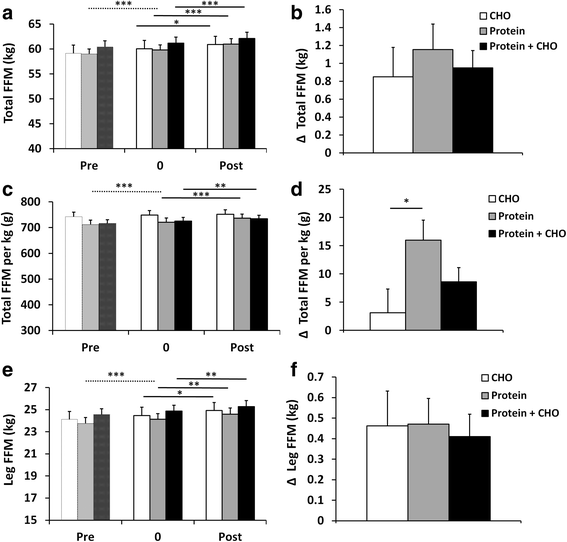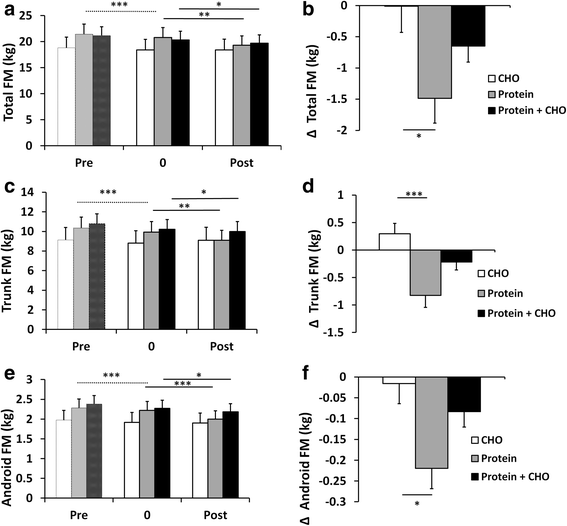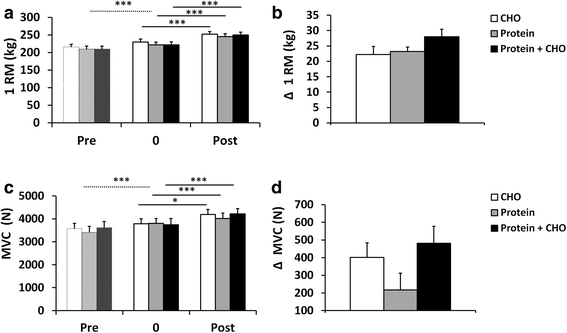The effects of whey protein with or without carbohydrates on resistance training adaptations - PubMed (original) (raw)
Randomized Controlled Trial
The effects of whey protein with or without carbohydrates on resistance training adaptations
Juha J Hulmi et al. J Int Soc Sports Nutr. 2015.
Abstract
Background: Nutrition intake in the context of a resistance training (RT) bout may affect body composition and muscle strength. However, the individual and combined effects of whey protein and carbohydrates on long-term resistance training adaptations are poorly understood.
Methods: A four-week preparatory RT period was conducted in previously untrained males to standardize the training background of the subjects. Thereafter, the subjects were randomized into three groups: 30 g of whey proteins (n = 22), isocaloric carbohydrates (maltodextrin, n = 21), or protein + carbohydrates (n = 25). Within these groups, the subjects were further randomized into two whole-body 12-week RT regimens aiming either for muscle hypertrophy and maximal strength or muscle strength, hypertrophy and power. The post-exercise drink was always ingested immediately after the exercise bout, 2-3 times per week depending on the training period. Body composition (by DXA), quadriceps femoris muscle cross-sectional area (by panoramic ultrasound), maximal strength (by dynamic and isometric leg press) and serum lipids as basic markers of cardiovascular health, were analysed before and after the intervention.
Results: Twelve-week RT led to increased fat-free mass, muscle size and strength independent of post-exercise nutrient intake (P < 0.05). However, the whey protein group reduced more total and abdominal area fat when compared to the carbohydrate group independent of the type of RT (P < 0.05). Thus, a larger relative increase (per kg bodyweight) in fat-free mass was observed in the protein vs. carbohydrate group (P < 0.05) without significant differences to the combined group. No systematic effects of the interventions were found for serum lipids. The RT type did not have an effect on the adaptations in response to different supplementation paradigms.
Conclusions: Post-exercise supplementation with whey proteins when compared to carbohydrates or combination of proteins and carbohydrates did not have a major effect on muscle size or strength when ingested two to three times a week. However, whey proteins may increase abdominal fat loss and relative fat-free mass adaptations in response to resistance training when compared to fast-acting carbohydrates.
Keywords: Hypertrophy; Nutrition; Resistance training; Skeletal muscle; Supplement.
Figures
Fig. 1
a Total fat-free mass (FFM), (b) total FFM changes, (c) relative FFM (total FFM divided by the body weight), (d) relative FFM changes, (e) leg FFM, and (f) leg FFM changes. The changes are from the beginning of supplementation (week 0) to the end of the training period (week 12) in carbohydrate (CHO), protein, and protein and carbohydrate groups. * p < 0.05, ** p < 0.01, *** p < 0.001 depict significant differences. During the preparatory RT period the difference to the week 0 is analyzed as one group and depicted using dashed line as no supplementation was provided before the week 0
Fig. 2
Total fat mass (a), total fat mass changes (b), trunk fat mass (c), trunk fat mass changes (d), android fat mass (e), android fat mass changes (f) in carbohydrate (CHO), protein, and protein and carbohydrate groups. * (p < 0.05), ** (p < 0.01), *** (p < 0.001) depict significant differences within each treatment (a, c, e) or between the treatments (b, d, f).
Fig. 3
Maximal dynamic strength 1RM (a), changes in 1RM (b), isometric strength (MVC) (c) and changes in isometric strength (MVC) (d) in carbohydrate (CHO), protein, and protein and carbohydrate groups. * p < 0.05, *** (p < 0.001) depict significant differences within each treatment (a, c, e) or between the treatments (b, d, f).
Fig. 4
Cross sectional area (CSA) of leg extensor muscles (quadriceps femoris, QF) excluding (vastus medialis muscle) (a) and absolute changes in CSA (b) in carbohydrate (CHO), protein, and protein and carbohydrate groups. *** (p < 0.001) depict significant differences within each treatment (a, c, e).
Similar articles
- Effects of whey proteins and carbohydrates on the efficacy of resistance training in elderly people: double blind, randomised controlled trial.
Arnarson A, Gudny Geirsdottir O, Ramel A, Briem K, Jonsson PV, Thorsdottir I. Arnarson A, et al. Eur J Clin Nutr. 2013 Aug;67(8):821-6. doi: 10.1038/ejcn.2013.40. Epub 2013 Mar 13. Eur J Clin Nutr. 2013. PMID: 23486511 Clinical Trial. - Intake of whey isolate supplement and muscle mass gains in young healthy adults when combined with resistance training: a blinded randomized clinical trial (pilot study).
Duarte NM, Cruz AL, Silva DC, Cruz GM. Duarte NM, et al. J Sports Med Phys Fitness. 2020 Jan;60(1):75-84. doi: 10.23736/S0022-4707.19.09741-X. Epub 2019 Sep 23. J Sports Med Phys Fitness. 2020. PMID: 31565912 Clinical Trial. - Effects of Whey, Soy or Leucine Supplementation with 12 Weeks of Resistance Training on Strength, Body Composition, and Skeletal Muscle and Adipose Tissue Histological Attributes in College-Aged Males.
Mobley CB, Haun CT, Roberson PA, Mumford PW, Romero MA, Kephart WC, Anderson RG, Vann CG, Osburn SC, Pledge CD, Martin JS, Young KC, Goodlett MD, Pascoe DD, Lockwood CM, Roberts MD. Mobley CB, et al. Nutrients. 2017 Sep 4;9(9):972. doi: 10.3390/nu9090972. Nutrients. 2017. PMID: 28869573 Free PMC article. Clinical Trial. - The effects of protein supplements on muscle mass, strength, and aerobic and anaerobic power in healthy adults: a systematic review.
Pasiakos SM, McLellan TM, Lieberman HR. Pasiakos SM, et al. Sports Med. 2015 Jan;45(1):111-31. doi: 10.1007/s40279-014-0242-2. Sports Med. 2015. PMID: 25169440 Review. - Effectiveness of whey protein supplementation on muscle strength and physical performance of older adults: A systematic review and meta-analysis of randomized clinical trials.
Al-Rawhani AH, Adznam SN, Abu Zaid Z, Md Yusop NB, M Sallehuddin H, Alshawsh MA. Al-Rawhani AH, et al. Clin Nutr. 2024 Oct;43(10):2412-2426. doi: 10.1016/j.clnu.2024.08.033. Epub 2024 Sep 5. Clin Nutr. 2024. PMID: 39303495
Cited by
- Resistance training status modifies inflammatory response to explosive and hypertrophic resistance exercise bouts.
Ihalainen JK, Ahtiainen JP, Walker S, Paulsen G, Selänne H, Hämäläinen M, Moilanen E, Peltonen H, Mero AA. Ihalainen JK, et al. J Physiol Biochem. 2017 Nov;73(4):595-604. doi: 10.1007/s13105-017-0590-0. Epub 2017 Sep 15. J Physiol Biochem. 2017. PMID: 28914426 - Comparative Meta-Analysis of the Effect of Concentrated, Hydrolyzed, and Isolated Whey Protein Supplementation on Body Composition of Physical Activity Practitioners.
A Castro LH, S de Araújo FH, M Olimpio MY, B de B Primo R, T Pereira T, F Lopes LA, B S de M Trindade E, Fernandes R, A Oesterreich S. A Castro LH, et al. Nutrients. 2019 Sep 2;11(9):2047. doi: 10.3390/nu11092047. Nutrients. 2019. PMID: 31480653 Free PMC article. - The short-term effect of high versus moderate protein intake on recovery after strength training in resistance-trained individuals.
Roberts J, Zinchenko A, Suckling C, Smith L, Johnstone J, Henselmans M. Roberts J, et al. J Int Soc Sports Nutr. 2017 Nov 21;14:44. doi: 10.1186/s12970-017-0201-z. eCollection 2017. J Int Soc Sports Nutr. 2017. PMID: 29200983 Free PMC article. Clinical Trial. - Vitamin D supplementation does not enhance resistance training-induced gains in muscle strength and lean body mass in vitamin D deficient young men.
Savolainen L, Timpmann S, Mooses M, Mäestu E, Medijainen L, Tõnutare L, Ross F, Lellsaar M, Unt E, Ööpik V. Savolainen L, et al. Eur J Appl Physiol. 2021 Jul;121(7):2077-2090. doi: 10.1007/s00421-021-04674-9. Epub 2021 Apr 5. Eur J Appl Physiol. 2021. PMID: 33821332 Clinical Trial. - Vitamin D Supplementation Does Not Enhance Gains in Muscle Strength and Lean Body Mass or Influence Cardiorespiratory Fitness in Vitamin D-Insufficient Middle-Aged Men Engaged in Resistance Training.
Savolainen L, Timpmann S, Mooses M, Mäestu E, Medijainen L, Lellsaar M, Tiimann K, Piir A, Zilmer M, Unt E, Ööpik V. Savolainen L, et al. Nutrients. 2024 Oct 2;16(19):3356. doi: 10.3390/nu16193356. Nutrients. 2024. PMID: 39408324 Free PMC article. Clinical Trial.
References
- Wolfe RR. The underappreciated role of muscle in health and disease. Am J Clin Nutr. 2006;84:475–82. - PubMed
Publication types
MeSH terms
Substances
LinkOut - more resources
Full Text Sources
Other Literature Sources
Medical



